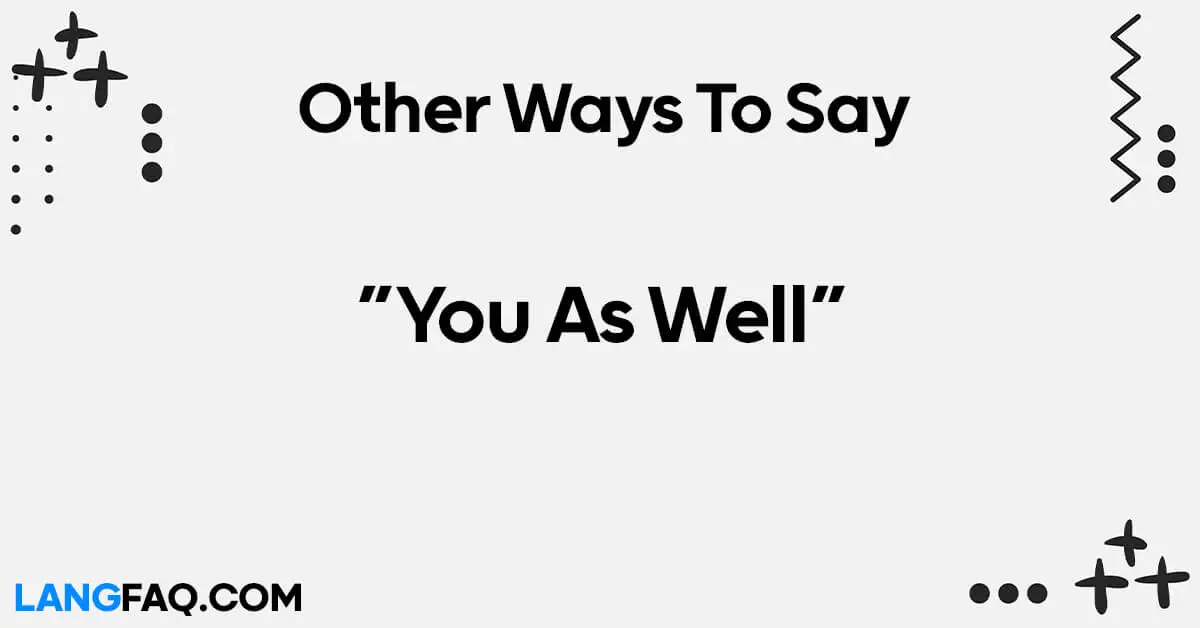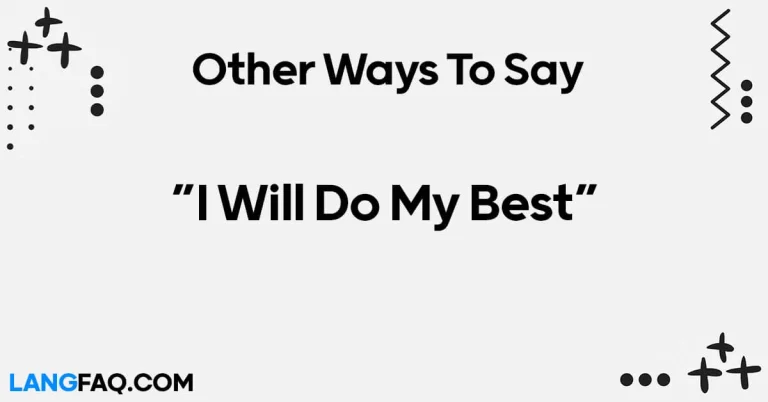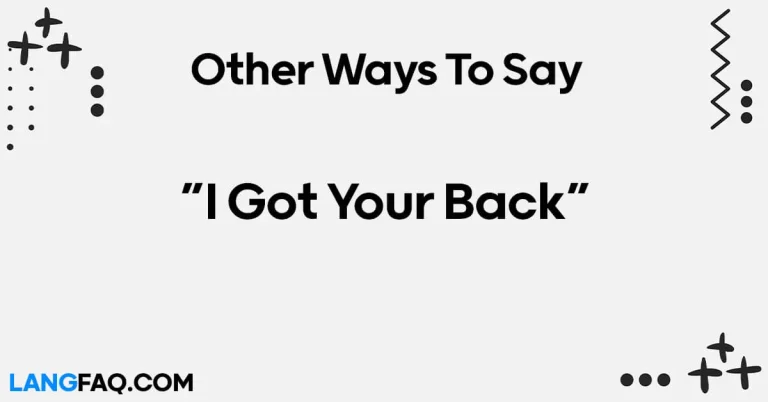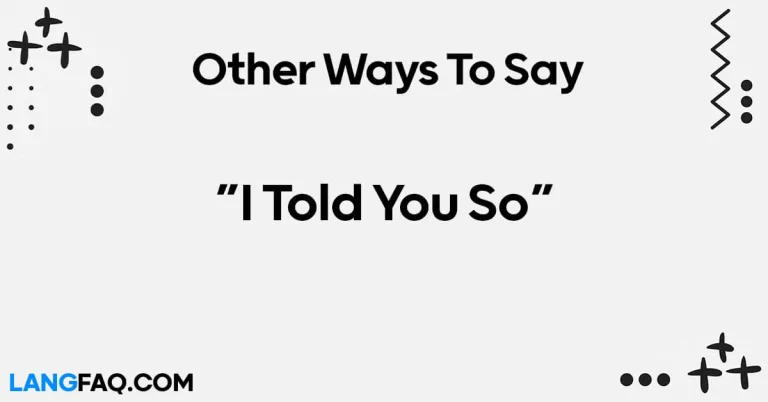In the realm of language, variety is the spice that adds flavor to our expressions. When it comes to responding with “You As Well,” there’s a multitude of alternatives that can enrich your communication. In this article, we’ll delve into 12 unique ways to convey the same sentiment, offering you a linguistic toolkit for diverse interactions.
12 Other Ways to Say “You As Well”
Here are 12 other ways to say “You As Well”:
- In the same manner
- Mutual sentiments to you
- Similarly for you
- Likewise
- Back at you
- The feeling is mutual
- Correspondingly
- Right back at you
- Echoing your sentiment
- Affirmative
- Ditto
- Reflecting the same
| Expression | Meaning | Example |
|---|---|---|
| In the same manner | Responding similarly | “I appreciate your kindness. In the same manner, I wish you the best.” |
| Mutual sentiments to you | Wishing the same sentiments in return | “Your success is inspiring. Mutual sentiments to you on your achievements.” |
| Similarly for you | Expressing parallel sentiments | “Your dedication is admirable. Similarly for you, may you achieve great things.” |
| Likewise | Mirroring the sentiment expressed | “You’ve been a great friend. Likewise, it’s always a pleasure to be around you.” |
| Back at you | Returning the same sentiment | “Thanks for your support. Back at you, I’m here for you anytime.” |
| The feeling is mutual | Acknowledging shared sentiments | “Your friendship means a lot. The feeling is mutual, my friend.” |
| Correspondingly | Responding in a corresponding manner | “Your enthusiasm is contagious. Correspondingly, I share your excitement.” |
| Right back at you | Returning the sentiment with warmth | “Your positivity is infectious. Right back at you, keep spreading the good vibes.” |
| Echoing your sentiment | Reflecting and amplifying the expressed sentiment | “Your concern is valid. Echoing your sentiment, let’s find a solution together.” |
| Affirmative | Positively agreeing or confirming | “Your proposal is accepted. Affirmative, let’s move forward with the plan.” |
| Ditto | Informally expressing agreement | “Enjoy your weekend! Ditto, have a great one too!” |
| Reflecting the same | Indicating a shared reflection | “Your perspective is insightful. Reflecting the same, I see the situation similarly.” |
Diversifying your responses with these alternatives not only adds depth to your expressions but also allows you to tailor your reply to different situations. Whether you’re in a formal or informal setting, these phrases offer versatility and enhance the richness of your communication.
Is It Correct to Say “You As Well”?
Absolutely, saying “You As Well” is grammatically correct and widely used in everyday conversation. This phrase is a polite and concise way to reciprocate good wishes or sentiments expressed by someone else. It is often used to acknowledge and mirror a positive sentiment or action.
Usage in Different Contexts:
- Informal Settings: In casual conversations with friends, family, or acquaintances, “You As Well” is a friendly and straightforward way to respond when someone wishes you well. For example:
- Friend: “Have a great day!”
- Your Response: “You As Well!”
- Formal Settings: In more formal or professional contexts, using “You As Well” can maintain politeness while reciprocating good wishes. For instance:
- Colleague: “I hope the meeting goes well for you.”
- Your Response: “Thank you, You As Well.”
Variations and Alternatives: While “You As Well” is a common and widely accepted expression, it’s always good to diversify your language. Consider using some of the alternatives mentioned earlier to add variety to your responses. Phrases like “Likewise,” “In the same manner,” or “Mutual sentiments to you” can convey similar meanings with a touch of sophistication or warmth, depending on the context.
Grammar Note: It’s essential to note that “You As Well” is a complete and grammatically correct sentence. However, in more formal or elaborate communication, you may choose to expand your response for clarity or to convey a more nuanced sentiment.
Example in a Sentence:
- Co-worker: “Best of luck with your presentation.”
- Your Response: “Thank you! I appreciate it. You As Well for your upcoming projects.”
In conclusion, “You As Well” is not only correct but also widely accepted in both spoken and written English. Feel free to use it in various situations to reciprocate good wishes and maintain positive and polite communication.
Professional Mail Example With “You As Well”
Subject: Appreciation for Your Support
Dear [Colleague’s Name],
I trust this email finds you well. I wanted to express my gratitude for your invaluable support during the recent project. Your dedication and collaborative spirit truly made a significant impact, and I appreciate the effort you put into ensuring its success.
As we navigate through various challenges together, it becomes evident that our team’s strength lies in the collective commitment of each member. Your contributions have not gone unnoticed, and I wanted to take a moment to acknowledge your exceptional work.
I look forward to our continued collaboration and the successful completion of future projects. If there’s anything I can assist you with, please don’t hesitate to reach out. Your dedication to excellence is inspiring.
Wishing you continued success and accomplishment in all your endeavors. You As Well play a crucial role in the success of our team, and your efforts are highly valued.
Thank you once again, and I appreciate your ongoing commitment to our shared goals.
Best regards,
[Your Full Name] [Your Position] [Your Company] [Contact Information]
In the Same Manner: Navigating Consistency in Response
Responding “In the same manner” is a sophisticated way to reciprocate sentiments, aligning with the other person gracefully. This phrase is suitable for both formal and informal contexts, offering a respectful acknowledgment of the shared sentiment.
Explanation and Scenario: “In the same manner” is particularly effective in professional settings. For example, if a colleague expresses gratitude for your collaboration, responding with “In the same manner, I value our teamwork” maintains a formal tone. In an informal context, if a friend wishes you success, you can say, “In the same manner, I hope your endeavors flourish too.”
Example Sentence: Colleague: “Thank you for your contribution to the project.” Your Response: “In the same manner, I appreciate the collaborative effort.”
Email Sample:
Subject: Appreciation for Teamwork
Hi [Colleague’s Name],
I wanted to express my gratitude for your collaboration on the recent project. Your dedication was evident, and I value our teamwork. In the same manner, let’s continue achieving great results together.
Best regards, [Your Name]
Mutual Sentiments to You: Enhancing Connection through Shared Wishes
Expressing “Mutual sentiments to you” is a warm way to reciprocate while emphasizing a shared emotional connection. This phrase is versatile, suitable for various relationships and settings.
Explanation and Scenario: This expression works well in both professional and personal contexts. For instance, if a mentor congratulates you on a career milestone, responding with “Mutual sentiments to you” conveys respect and shared joy. In a friendly exchange, if a neighbor wishes you happiness, saying, “Mutual sentiments to you, may your days be filled with joy too” adds a personal touch.
Example Sentence: Mentor: “Congratulations on your promotion!” Your Response: “Mutual sentiments to you. Your guidance has been invaluable in my professional journey.”
Email Sample:
Subject: Gratitude for Your Guidance
Dear [Mentor’s Name],
Thank you for your heartfelt congratulations on my recent promotion. Mutual sentiments to you, as your guidance played a crucial role in my success. Looking forward to more achievements together.
Warm regards, [Your Name]
Similarly for You: Aligning Expressions in Diverse Scenarios
Choosing to respond “Similarly for you” is a versatile way to convey parallel sentiments. This phrase is adaptable to both formal and informal conversations, fostering a sense of connection.
Explanation and Scenario: “Similarly for you” works well in various settings. In a professional context, if a business partner wishes you prosperity, responding with “Similarly for you, may your ventures thrive” maintains a professional tone. In a casual chat with a friend, if they express excitement about an upcoming trip, saying, “Similarly for you, have an amazing time!” adds warmth.
Example Sentence: Business Partner: “Wishing you success in your endeavors.” Your Response: “Similarly for you. May our partnership bring mutual prosperity.”
Email Sample:
Subject: Shared Aspirations for Success
Hello [Business Partner’s Name],
Thank you for your well wishes. Similarly for you, I look forward to the success and growth of our collaborative efforts.
Best regards, [Your Name]
Likewise: Mirroring Sentiments with Grace
“Likewise” is a classic alternative that subtly mirrors the sentiment expressed to you. It’s concise, polite, and effortlessly communicates reciprocity.
Explanation and Scenario: Whether in a professional email or a friendly chat, “Likewise” is a versatile option. If a colleague expresses appreciation for your support, responding with “Likewise, your contributions are valued” maintains a formal tone. In a casual conversation with a friend wishing you a great weekend, saying “Likewise, enjoy your weekend too!” is a simple and effective response.
Example Sentence: Colleague: “Thanks for your support during the project.” Your Response: “Likewise, your efforts were crucial to our success.”
Email Sample:
Subject: Appreciation for Teamwork
Dear [Colleague’s Name],
I appreciate your acknowledgment of my contributions to the project. Likewise, your dedication and teamwork have not gone unnoticed.
Best regards, [Your Name]
Back at You: Infusing Informality with Warm Reciprocity
The informal “back at you” maintains a friendly tone while reciprocating a sentiment. It’s casual yet genuine, making it suitable for various social contexts.
Explanation and Scenario: “Back at you” works well in casual and friendly exchanges. If a friend wishes you a fantastic day, responding with “Back at you, have a great one too!” is an easygoing and sincere reply. In a more formal setting, if a colleague expresses appreciation for your assistance, saying “Back at you, your teamwork is commendable” adds a personal touch.
Example Sentence: Friend: “Wishing you a fantastic day!” Your Response: “Back at you, make it amazing!”
Email Sample:
Subject: Appreciation for Teamwork
Hi [Colleague’s Name],
Your appreciation means a lot. Back at you, I value our collaboration and teamwork.
Best regards, [Your Name]
The Feeling is Mutual: Acknowledging Shared Emotions
When sentiments are mutual, expressing it outright with “The feeling is mutual” is powerful. It conveys a shared sentiment and fosters a sense of connection.
Explanation and Scenario: This phrase is suitable for situations where there’s a deep resonance with the expressed sentiment. If a friend expresses gratitude for your support, responding with “The feeling is mutual, I’m grateful for our friendship” adds depth. In a professional context, if a colleague acknowledges your hard work, saying “The feeling is mutual, I admire your dedication too” creates a positive exchange.
Example Sentence: Friend: “Thank you for always being there for me.” Your Response: “The feeling is mutual. I value our friendship.”
Email Sample:
Subject: Gratitude for Collaboration
Dear [Colleague’s Name],
Your acknowledgment of my hard work is appreciated. The feeling is mutual, and I admire your dedication to our projects.
Best regards, [Your Name]
Correspondingly: Adding Formality to Professional Responses
Choosing “correspondingly” elevates your response, adding a touch of formality to the conversation. It’s an excellent option for more professional settings.
Explanation and Scenario: “Correspondingly” is well-suited for professional emails or discussions. If a business partner expresses optimism about a project, responding with “Correspondingly, I share your enthusiasm for our collaboration” maintains a formal tone. In a formal chat with a colleague praising your presentation, saying “Correspondingly, I appreciate your acknowledgment” adds a polished touch.
Example Sentence: Business Partner: “I’m optimistic about our upcoming project.” Your Response: “Correspondingly, I share your enthusiasm and look forward to its success.”
Email Sample:
Subject: Shared Enthusiasm for the Project
Hello [Business Partner’s Name],
Your optimism about our upcoming project is inspiring. Correspondingly, I share your enthusiasm and am committed to our collaborative success.
Best regards, [Your Name]
Right Back at You: A Friendly Exchange of Sentiments
Adding a touch of warmth, “right back at you” is a friendly way to reciprocate. It’s casual yet sincere, making it suitable for various informal exchanges.
Explanation and Scenario: “Right back at you” works well in casual conversations, adding a personal touch. If a friend wishes you a wonderful day, responding with “Right back at you, make the most of it!” creates a friendly exchange. In a less formal work environment, if a colleague expresses appreciation for your support, saying “Right back at you, I appreciate your teamwork too” maintains a friendly and positive tone.
Example Sentence: Friend: “Have a fantastic day!” Your Response: “Right back at you, make it amazing!”
Email Sample:
Subject: Appreciation for Teamwork
Hi [Colleague’s Name],
Your appreciation means a lot. Right back at you, I value our collaboration and teamwork.
Best regards, [Your Name]
Echoing Your Sentiment: Infusing Poetry into Reciprocal Responses
Choose “echoing your sentiment” to convey a deep resonance with the expressed sentiment, adding a poetic touch to your response.
Explanation and Scenario: This phrase is ideal for situations where sentiments are profound and resonate deeply. If a friend expresses sorrow, responding with “Echoing your sentiment, I share your grief” adds empathy. In a reflective conversation about shared goals, saying “Echoing your sentiment, let’s strive for success together” adds a motivational touch.
Example Sentence: Friend: “I’m feeling a bit down today.” Your Response: “Echoing your sentiment, I’m here for you. Let’s talk and uplift each other.”
Email Sample:
Subject: Shared Vision for Success
Dear [Team Member’s Name],
In our recent discussion about our goals, your enthusiasm was palpable. Echoing your sentiment, I share the same passion for our success.
Best regards, [Your Name]
Reflecting the Same: Gracefully Acknowledging Shared Sentiments
“Reflecting the same” is a graceful way to reciprocate, emphasizing the mutual nature of the sentiment. It’s a thoughtful choice for more introspective conversations.
Explanation and Scenario: This phrase is suitable for situations where sentiments are thoughtful and require a sincere acknowledgment. If a colleague praises your creativity, responding with “Reflecting the same, I admire your innovative approach” adds depth to the exchange. In a reflective discussion about shared values, saying “Reflecting the same, let’s uphold integrity in our work” emphasizes a shared commitment.
Example Sentence: Colleague: “Your creativity brings a fresh perspective to our projects.” Your Response: “Reflecting the same, I appreciate your innovative approach to problem-solving.”
Email Sample:
Subject: Acknowledgment of Shared Values
Hi [Colleague’s Name],
In our recent discussion about our work values, your commitment to integrity stood out. Reflecting the same, I’m dedicated to upholding these values in our projects.
Best regards, [Your Name]
Affirmative: Assertive Agreement with a Positive Touch
Opt for “affirmative” for a positive and assertive response. It adds a confident touch to your agreement while maintaining a professional demeanor.
Explanation and Scenario: “Affirmative” is suitable for situations where a clear and positive agreement is required. In a professional setting, if a team member proposes a solution, responding with “Affirmative, let’s implement that strategy” provides a decisive response. In a casual conversation about weekend plans with friends, saying “Affirmative, I’m up for a movie night!” expresses enthusiasm.
Example Sentence: Team Member: “I propose we implement this strategy for the project.” Your Response: “Affirmative, let’s proceed with that approach.”
Email Sample:
Subject: Agreement on Project Strategy
Hello [Team Member’s Name],
I’ve reviewed your proposal for the project strategy. Affirmative, let’s move forward with the implementation. Your insights are valued.
Best regards, [Your Name]
Ditto: Playful Agreement for Light-hearted Exchanges
A playful and lighthearted choice, “ditto” is a simple way to express agreement or shared feelings. It’s casual yet effective in conveying your response.
Explanation and Scenario: “Ditto” works well in informal and friendly exchanges, adding a touch of playfulness. If a friend expresses excitement about plans, responding with “Ditto, can’t wait!” creates an easygoing conversation. In a less formal work environment, if a colleague praises your teamwork, saying “Ditto, it’s a pleasure working with you” adds a positive vibe.
Example Sentence: Friend: “I’m so excited about our weekend plans!” Your Response: “Ditto, can’t wait for the weekend to arrive!”
Email Sample:
Subject: Excitement for Upcoming Project
Hi [Colleague’s Name],
Your enthusiasm for our upcoming project is contagious. Ditto, it’s a pleasure working with you. Let’s make this project a success!
Best regards, [Your Name]
Frequently Asked Questions (FAQs)
How can I make my responses more engaging when reciprocating sentiments?
To make your responses more engaging, consider using phrases like “In the same vein” or “The feeling is mutual.” These alternatives add depth and interest to your expressions.
Are these alternatives suitable for both formal and informal settings?
Yes, the provided alternatives are versatile and can be used in both formal and informal settings. Choose the expression that aligns with the tone of your conversation.
Can I use these alternatives in written communication?
Absolutely! These alternatives are applicable in both spoken and written communication. Feel free to diversify your language in emails, messages, or any written correspondence.
Is it necessary to match the formality of the original expression?
While it’s not mandatory, matching the formality of the original expression can enhance the coherence of your response. Adjust your choice based on the context and level of formality.
Are there cultural considerations when using these alternatives?
These alternatives are generally neutral, but it’s advisable to be mindful of cultural nuances. Always consider the context and cultural background of your communication.
Can I use these expressions in professional settings?
Certainly! Alternatives like “correspondingly” and “affirmative” are well-suited for professional settings, offering a polished and articulate response.
Conclusion
Diversifying your responses to “You As Well” not only enriches your language but also fosters meaningful connections. Experiment with these alternatives, adapting them to various situations to enhance your communication skills. Remember, language is a tool of expression, and the more versatile your toolkit, the more nuanced and impactful your conversations become.







